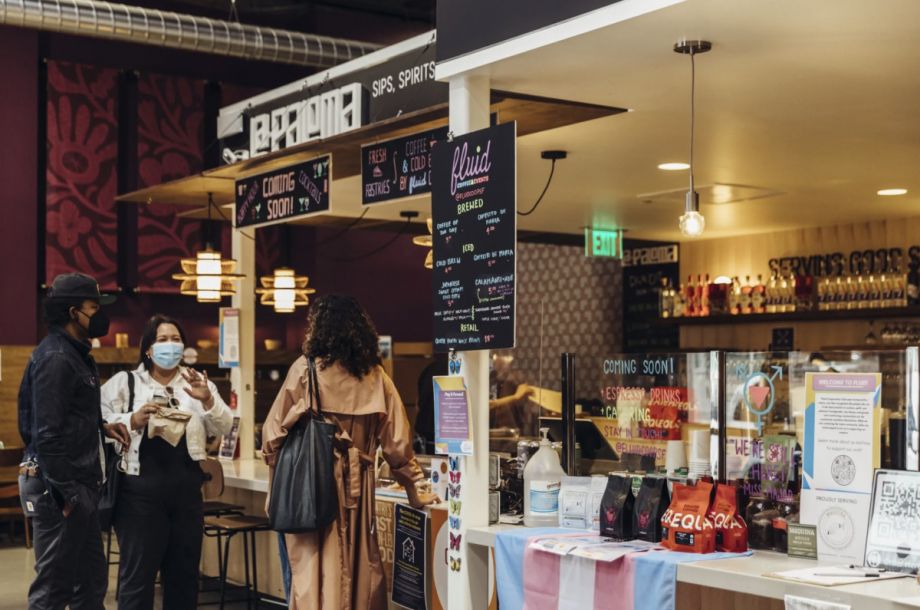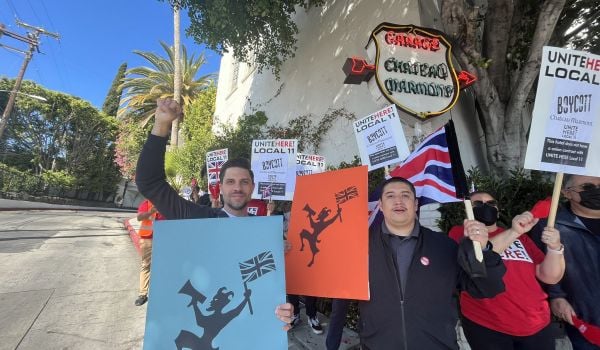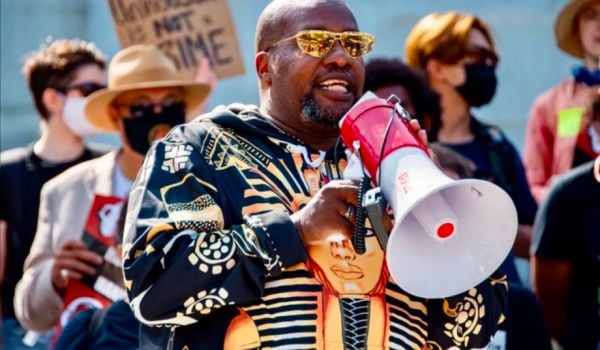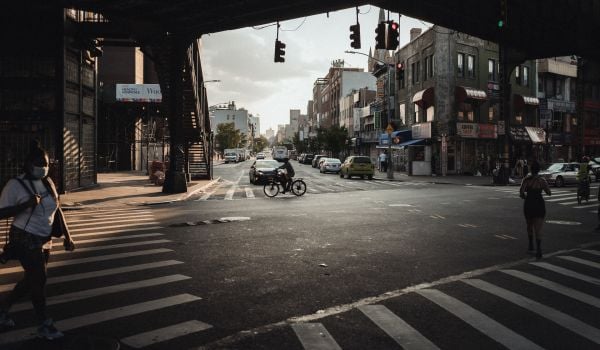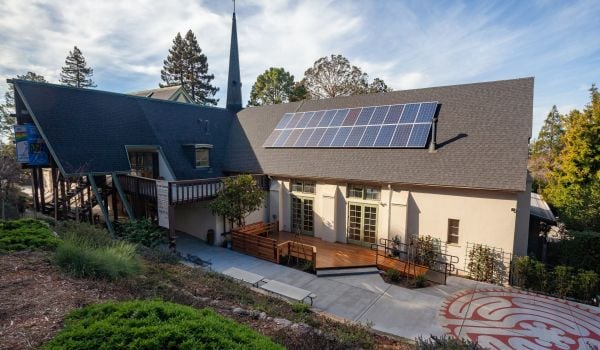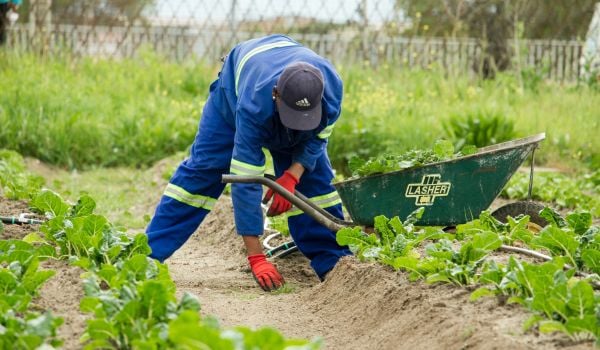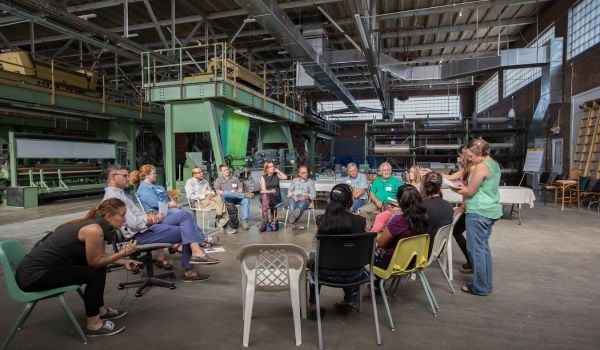This article was co-published by Prism and Next City as part of our Solutions for Economic Equity partnership, highlighting how low-income and marginalized BIPOC communities are cultivating, building, and seizing economic justice in cities across the U.S.
In April 2021, the La Cocina Municipal Marketplace quietly opened in San Francisco’s Tenderloin district, offering only takeout amid the emergent Delta variant and ongoing Covid-19 restrictions on public gathering. Inside were six businesses, then seven, owned by immigrant women entrepreneurs, graduates of the La Cocina business incubator, which supports working-class women of color and immigrant women with food enterprises. Since 2005, the incubator has helped 140 such enterprises open for business.
While some entrepreneurs had long since graduated from the program and started businesses elsewhere, others were entering the space as first-time owners of a brick-and-mortar business. But they all shared the experience of being mothers, immigrants and startup business owners in one of the most competitive restaurant scenes in the country—and amid an unprecedented economic crisis.
Many would have assumed the marketplace would quickly fail, but as they approach their third year in business, the entrepreneurs have established La Cocina Municipal Marketplace as a mainstay in the Tenderloin, even earning it a spot among San Francisco Chronicle’s Top 25 Restaurants last year.
Leticia Landa, La Cocina’s deputy director, credits the community they built for their survival, even under the most brutal of circumstances. Landa spoke with Next City about the unique and intersecting challenges facing La Cocina graduates, the marketplace’s perseverance and eventual success, and what’s next as La Cocina approaches 20 years of business and community-building. This interview has been edited for clarity.
Next City: It is well documented how the pandemic has disproportionately impacted parents, people of color, working-class communities and essential workers like restaurant staff. La Cocina’s community sits at the intersection of all of the above. What has the pandemic been like for your graduates?
Landa: What made it so difficult for our community was that we’re right at the nexus of food businesses owned by immigrant women and women of color. And many of our business owners are mothers and grandmothers, so I think that the biggest impact was that there was no school.
School was at home on Zoom, but if you’re the entrepreneur and the breadwinner — and the mother — how does that play out? It was like people making $9 meals in what used to be their restaurant, with their kid next to them trying to figure out how to zoom into their classroom. Then you add in the barriers of language and technology that communities of color deal with when English is most often not a first language.
Children of color, and generally lower-income children, are mostly in public schools and don’t have the pods or the stay-at-home moms who are able to create some sort of semblance of normalcy for them. That’s just not the world that we’re in. And so it was brutal.
But their businesses survived, which you attribute to having a strong community. How did you maintain that lifeline during a time when we all had to isolate?
During the pandemic, we did virtual gatherings where we had “town halls,” which were these big Zoom meetings, where we gave out information about what’s going on, or “here are the grants and government programs you can apply to.” Just having that ability to touch base once a week and connect was very life-giving.
And, even though there were so many restrictions on gathering and how to do it, the fact that we were able to keep our kitchen open was really significant because people had a place to go and were cooking alongside other people, so there was some semblance of normalcy, I think, which was really useful. There was a camaraderie and community of encouragement that had a “we’ve got this and we’ve got each other’s backs” kind of feeling. I don’t know if that happened as much in higher income or more privileged communities, where there weren’t that many essential workers and people weren’t actually seeing other people. Maybe that’s a little bit too Pollyanna of me, but I can’t help but think that there’s something there.
Yes, the pandemic hit BIPOC and immigrant communities the hardest, but I also feel that our communities are inherently resilient just by having made it to the US and dealing with systemic racism day in and day out. The fact that the businesses did make it through — they didn’t have to close for the most part — must have something to do with just the will to keep going when everything was sort of stacked against us.
Then you went further and opened a marketplace amid all of that.
So, we’d been planning for the marketplace since before the pandemic, and for us, it was really important for community to be a real part of getting that place started. This is the first time that we had multiple businesses all graduating into the same location. They came up with their own mission and vision and the values that they wanted to carry into the space. They met monthly to plan and support one another as they were figuring out their menus, their operation, and shared staffing. So, because we had been building that community before the pandemic, they already felt like they were in this together. Opening during a horrible time, when there were very few sales, they really felt supported by each other and by this vision for what the space could be.
What’s unique and unusual is how the marketplace businesses built community cross-culturally. When you think of immigrant-owned businesses and the communities around them, you tend to think that they’re homogenous, or at least monolingual.
We wanted to have a mix of cuisines. Yes, they’re from different countries, but there are so many things that they have in common, namely, that they’re all mothers. They are all business owners, and they’re all trying to figure out how to run a business in San Francisco. And I think because they have an understanding of what it’s like to be an immigrant, and what it’s like to not understand when you first arrive, they’re very kind about it. We have one monolingual Spanish speaker, and people often will jump in and support her if she’s having trouble with a POS system or a customer or something like that.
So much of what they’re going through day to day is very similar, and I think that kind of supersedes the cultural or language differences.
A global pandemic notwithstanding, San Francisco is a really challenging place to start a business, much less a food business in an already saturated market. It’s one of the most expensive cities in the country and one of the most gentrified. How do La Cocina graduates manage to survive such a competitive market?
This has been profiled in lots of different ways: immigrant communities getting pushed out of city centers, and pushed further and further into the suburbs, but their businesses are still typically concentrated back where they used to live.
For a long time, all of our graduates were graduating out to Hayward or Berkeley or Oakland, but very few in San Francisco just because the costs were so astronomical.The marketplace was actually a reaction to what gentrification was doing, which was pushing so many of our graduates out of San Francisco into the East Bay. We thought, we’re a San Francisco-based organization, how do we maintain small businesses here? How can we prove that there could be a different model? That’s really where the idea for the marketplace came from, to create a space for entrepreneurs that also could be community serving.
La Cocina has supported similar incubators elsewhere, in Sacramento, Stockton, Salt Lake City, and even Auckland, New Zealand. What have you learned about helping develop them in other cities and contexts?
I have learned, tragically, that the outsized barriers that women, immigrants, and BIPOC communities face exist all over this country and all over the world. [But] the resources business incubators can bring to their communities are key to addressing the racial wealth gap and income inequality more broadly. It’s been incredible to work with people in other cities who believe, like I do, that there’s talent and economic power in communities of color that we really need to be showcasing and celebrating.
Is that the direction you see La Cocina’s future headed, having La Cocina’s in different cities?
We get a lot of requests to start a La Cocina in different places, but you have to really understand your community and the food industry where you live. What are the barriers to immigrants and people of color in the food industry in your area? What are the kinds of small businesses that can be supported? What’s the community of customers that you’re going to be serving? We’ve decided that instead of doing replication, we really want to do consulting.
We started in 2005, and I think we’ve really proven what talented immigrants can do if provided with proper resources, so we want to share those best practices with other places. That’s a big part of what we’re trying to figure out strategically. How do we do that, and how do we do it in a way that’s not just like, “Here’s a workbook.” How do you really create community? How do you support people deeply? How do you prove to the funders in your area that this work is important? How do you get the funding to do it? Those are complex things that can’t just be shared like in a book.
And the marketplace? What is your goal for that space moving forward?
We want the marketplace to be a model of more inclusive economic development that other cities could look to. We really wanted to prove that there’s a reason to support small businesses in increasingly expensive inner cities — and that there’s a reason to support BIPOC and immigrant-owned businesses specifically — to be able to serve working-class communities in those places. It’s about making sure that the talent and entrepreneurial vision of these chefs — and their grind — is what is being showcased, celebrated, awarded, and then replicated in other places. As we think about our 20 years coming up, the next chapter for La Cocina is really about proving a point about our economy, about our cities, and how we want to see them develop.
It gives me hope to think about an alternative path to where capitalism is taking us. You can just look across the Bay at Silicon Valley and just despair at where we’re headed in the name of American competition, at the expense of the rest of us.
Yes, it runs a little counter-current to the direction that capitalism is taking things, where it’s just the bigger players who have opportunities. To me, the biggest injustice of why the odds are so stacked against women and communities of color is how, when you think of startups and tech and VC, [they’re given] so many millions of dollars to figure things out and fail quickly, but the ecosystem of our economy is not given that same space.
But we all have a say in that, right? When we spend our dollars on Amazon, we are supporting kajillionaires, but when we spend our dollars at small businesses owned by people who live in our communities, there’s power in that. So if you are in despair about where capitalism is trending, eat local. That’s cliche, but it’s real. You have a choice of where you’re shopping and where your dollars are going. And I think if people are mindful about that, that’s what’s going to shift these businesses’ ability to stay around.
This article is part of The Bottom Line, a series exploring scalable solutions for problems related to affordability, inclusive economic growth and access to capital. Click here to subscribe to our Bottom Line newsletter.
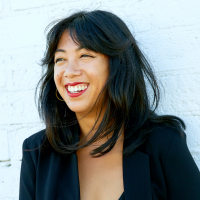
Frances Nguyen is a freelance writer, editor of the Women Under Siege section (which reports on gender-based and sexualized violence in conflict and other settings) at the Women's Media Center, and a member of the editorial team for Interruptr, an online space for women experts to disrupt discourse in traditionally male-dominated focus areas. She is currently working on a creative nonfiction portfolio on race, identity, and the American Dream.



